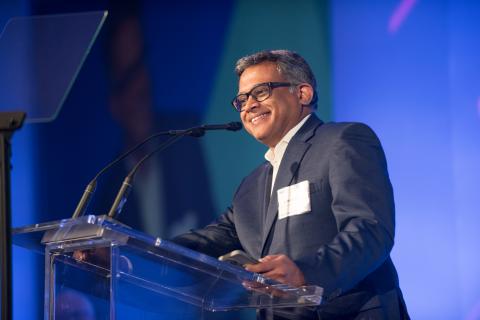The prestigious award, given by the Semiconductor Research Corporation and Semiconductor Industry Association, recognizes lifetime research contributions to the U.S. semiconductor industry by university faculty.
Suman Datta has received the 2024 University Research Award for Technology from the Semiconductor Research Corporation (SRC) and Semiconductor Industry Association (SIA). He was presented the award at the SIA Awards Dinner on Nov. 21, 2024, in San Jose, Calif.
The award recognizes lifetime research contributions to the U.S. semiconductor industry by university faculty. Since being established in 1995, only 50 faculty members from top universities around the U.S. have won the award.
"Professors Suman Datta and Michael Flynn join an illustrious group of past award winners who have made significant contributions to the semiconductor industry,” SRC President and CEO Todd Younkin said in a press release. “Their groundbreaking research and its translation into the commercial domain continue to drive innovation and excellence in our field.”
Datta, who is the Joseph M. Pettit Chair of Advanced Computing in the Georgia Tech School of Electrical and Computer Engineering (ECE) and a Georgia Research Alliance (GRA) Eminent Scholar, is just the second Georgia Tech faculty member to win the award. Former ECE professor Jim Meindl won the award in 1999.
He’s renowned for the design, fabrication, characterization, and compact modeling of nanoelectronic devices, as well as their applications in circuits for next-generation, energy-efficient, and high-performance computing.
Since coming to ECE in the Fall of 2022, Datta, who also has a joint appointment with the School of Materials Science and Engineering, has directed the Semiconductor Technology Advanced Research (STAR) Laboratory. The STAR research group focuses on novel semiconductor devices that enable new compute models such as in-memory compute, brain-inspired compute, and cryogenic compute.
Datta’s research is primarily funded by the National Science Foundation (NSF), Defense Advanced Research Projects Agency (DARPA), Department of Energy, Defense Threat Reduction Agency, Semiconductor Research Corporation, and semiconductor companies like Intel, Micron, Samsung Electronics, Applied Materials, EMD Performance Materials.
Datta had established himself as a recognized leader in semiconductor innovation, with over 20 years of experience before joining ECE
From 1999-2007, he was in the Advanced Transistor Group at Intel Corporation, where he led the research and development efforts for several generations of high-performance logic transistors such as high-k/metal gate, Tri-gate, and strained channel complementary metal-oxide-semiconductor transistors.
He then joined academia at the Pennsylvania State University (PSU), where he was a professor of electrical engineering until 2015. His group at PSU pioneered advances in compound semiconductor-based quantum-well field effect transistors and tunneling field effect transistors.
Datta continued to be at the forefront of semiconductor innovation during his time as the Stinson Endowed Chair Professor of Nanotechnology in the Electrical Engineering Department at the University of Notre Dame from 2015-2022. There, he was the director of several multi-university research centers.
Most notably, one of those centers, the Extremely Energy Efficient Collective Electronics (EXCEL), sponsored by NSF, explored an alternate computing hardware that leverages continuous-time dynamics of emerging devices to execute optimization, learning, and inference tasks.
Additionally, he led the ASCENT project (Applications and Systems-driven Center for Energy-Efficient integrated Nano Technologies) funded by SRC’s Joint University Microelectronics Program.
His work has resulted in over 475 journal and refereed conference papers and more than 187 issued patents related to semiconductor devices.
He’s received several other notable distinctions for his research, including being named a Fellow of IEEE and the National Academy of Inventors.
Datta received his undergraduate degree in electrical engineering from the Indian Institute of Technology in Kanpur, India, and his Ph.D. degree in electrical and computer engineering from the University of Cincinnati.
